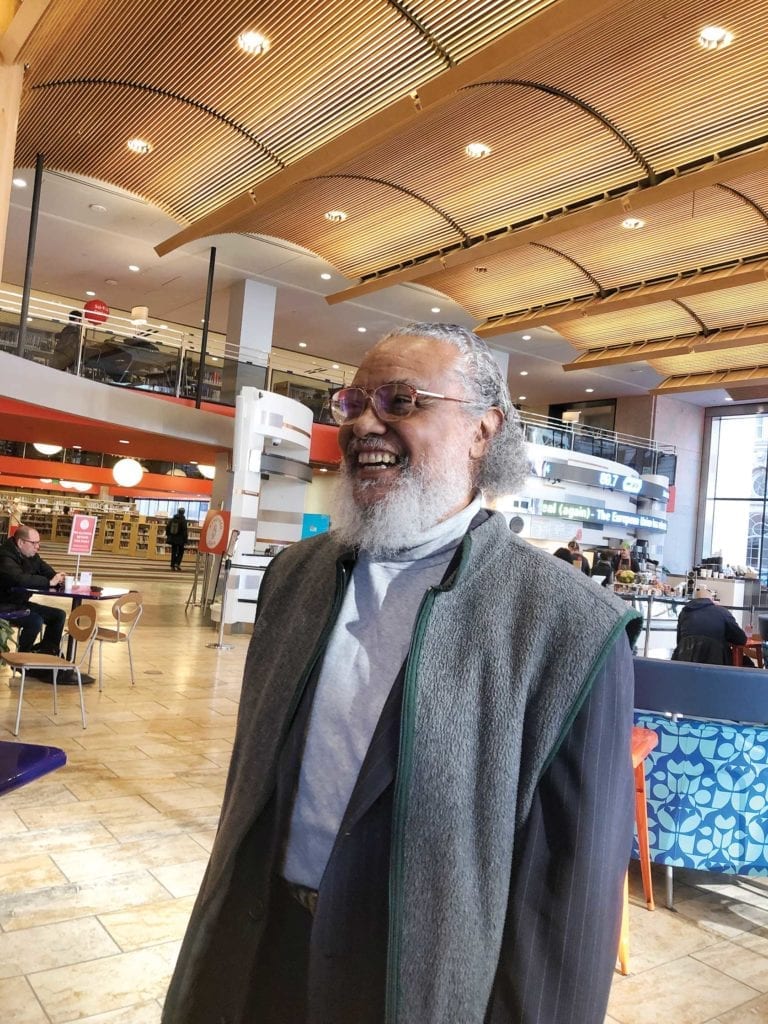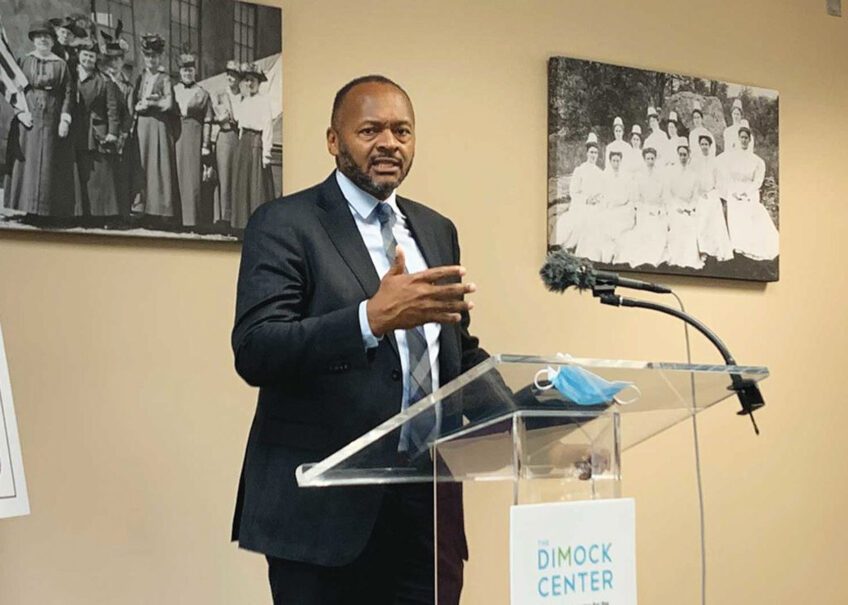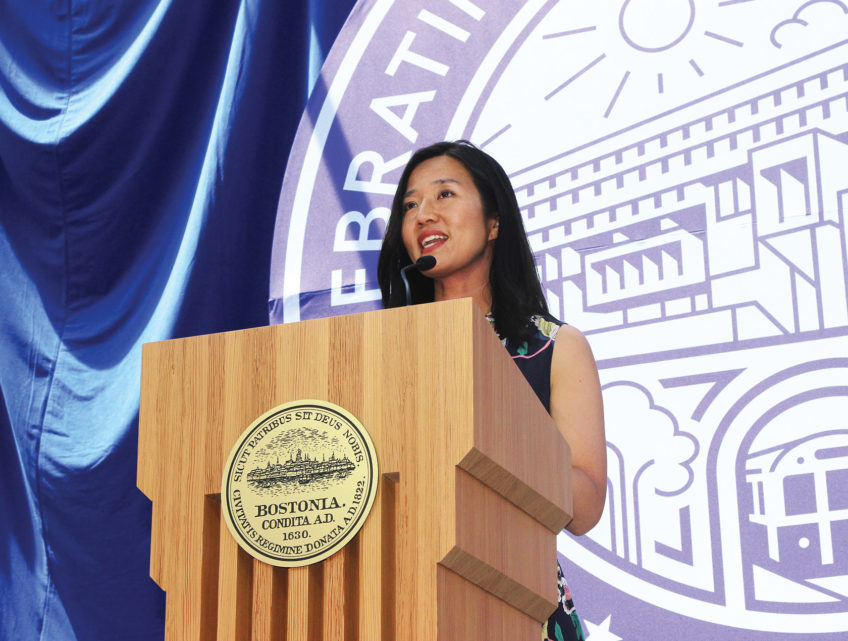
When Byron Rushing first attended a swearing-in ceremony on Beacon Hill, Tom Brady was five years old, apartheid still ruled in South Africa and you could rent a two-bedroom apartment in the South End for less than $500.
That was back in 1983, when the newly minted state representative first took office, succeeding Mel King in the South End seat he would hold for 36 years. Rushing’s 18-term run came to an end during the first week in January as Jon Santiago, who was born the year Rushing was first elected, took the oath of office to represent the 9th Suffolk District.
Santiago, a physician, Army reservist and Peace Corps veteran who spent his early years in Boston and moved back before medical school, defeated the prominent historian and powerful Beacon Hill fixture in the Democratic primary in September and waltzed to victory in the November final.
During an interview in the News Café at the main branch of the Boston Public Library the day after the ceremony, the 76-year-old retired lawmaker looked back on an electoral career that spanned enormous changes in politics and economics, both locally and nationally. That arc took him to the leadership ranks in the Legislature, his elevation to Assistant Majority Leader coming as African Americans and Latinos tripled their ranks in the House.
Rushing, raised in New York City and Syracuse, began his public career as a student activist who left Harvard to work with the Congress of Racial Equality and the Northern Student Movement in the early 1960s and later helped found Roxbury Associates, the precursor to one of the nation’s first community development corporations. He took office expecting to advance the broad cause of civil rights, but soon found himself focusing in on winning public acceptance of gays and lesbians through anti-discrimination measures and laws securing marriage rights.
“I found out very quickly this was going to be a big deal and that we were going through a transformation around gay people that we hadn’t done for other groups that had been discriminated against,” said Rushing, whose South End-based district, stretching from the Back Bay and the Fenway to Lower Roxbury, was the epicenter of Boston’s gay community.
“For black people, there was never a movement in the United States that said that black people couldn’t get married. It was just who you could get married to,” he said.
Victories
Rushing’s first legislative success around gay rights was getting sexual orientation added to the state’s anti-discrimination statutes. That landmark 1988 victory was followed by fights to protect people with AIDS from bias and then the long campaign for marriage equality, which toggled between the courts and the Legislature. The battle culminated in the Massachusetts Supreme Judicial Court ruling validating gay marriage and Rushing’s successful fight to block efforts on Beacon Hill to amend the state constitution to ban matrimony between same-sex couples.
Along the way, Rushing did not shy away from standing up to leaders like Gov. Michael Dukakis over adoption rights for gays, or to black ministers opposed to gay marriage, helping to arrange demonstrations against Dukakis in the State House and ripping the black clergy in floor speeches. Rushing, known for his smiling equanimity as much as his signature Frederick Douglass beard and coif, was uncharacteristically caustic in those moments where he risked breaking alliances in service of the larger cause.
“I was able to be a spokesperson for a lot of progressive changes at a time when a lot of progressive things were happening,” said Rushing, who was also active in the successful campaigns to end the death penalty in the state and divest state pension funds from companies doing business in South Africa.
Those fights, if appreciated at all, appeared as distant history to voters who turned out for change in the 2018 primary, said Rushing.
“Those struggles were the high points of my career, and then you get to the point where all these young gays and lesbians think this is the way it was forever,” he said. “They didn’t give a shit, not a shit, that I had done anything about it.”
Rushing cares about history more than most. As executive director of the Museum of Afro-American History from 1972 to 1985, he led the acquisition and restoration of the African Meeting House on Beacon Hill and the creation of the Black Heritage Trail. In the Legislature, he sponsored the creation of the Roxbury Heritage State Park headquartered in the Dillaway-Thomas House in Eliot Square — and he still leads history tours around the city.
But he also acknowledges, with a trace of bleak humor, that his electoral career got caught in the crosshairs of a volatile electorate seeking change.
“All the smart people who told me how to run the race were dopes,” said Rushing. “They completely missed it. They missed what was happening around the post-Trump excitement among Democrats. You had people voting who had never voted before in primaries and you had these large turn-outs that no one predicted. And then we didn’t notice until it was too late. The minute I got out on the street in July after a long session, I knew this was a different ballgame. People were looking for a change.”
Santiago, running in a district both whiter and wealthier than ever before, conducted an aggressive door-to-door campaign with a prescription for addressing the impact of substance abuse on the South End with its high concentration of treatment facilities. Santiago took 48 percent of the primary vote, Rushing 37 percent, with the remainder divided between a third candidate and a high number of blanks. On the same day, Democratic voters turned out powerful House Ways and Means Chairman Jeffrey Sanchez of Jamaica Plain in favor of challenger Nika Elugardo, and 10-term incumbent U.S. Congressman Michael Capuano lost by 17 points to Boston City Councilor Ayanna Pressley.
Unfinished business
Rushing’s post-election plans are to “relax and retire,” he said. “I mean really retire — and that means a lot of paperwork.”
He and his wife, Frieda Garcia, the former director of United South End Settlements, own a house in Concord Square just a few blocks from the Boston Public Library, where he serves as a trustee. He plans to continue his work with the library, help revitalize the Roxbury Historical Society and do more volunteer work with the Episcopal Church, where he serves as vice president of its House of Deputies — the highest elected position of any layman in the church.
Rushing cites his faith and Jesus’s example of ministering to the poor as the most important motivating force in his work. The lack of progress in significantly relieving the economic plight of the least among us is Rushing’s lasting regret in looking back on his career.
“The biggest unfinished piece of progressive business is economics and poverty,” said Rushing, whose mother was an immigrant seamstress from Jamaica and his father a janitor from Georgia. “And the symbol for me of poverty is really homelessness. Most advocates are unwilling to assert economic rights for the poor, or even housing as a right.”
Rushing succeeded in increasing funding for homelessness and affordable housing nearly every year during his legislative career and spoke out against gentrification, once memorably calling the old elevated Orange Line, “our Eiffel Tower on its side” and correctly predicting that its removal would accelerate displacement.
He also pushed for affordable housing downtown, arguing the poor ought to have easy access to public transportation, shopping, schools and work — conveniences he enjoys with a South End address.
Rushing said he gave up his driver’s license long ago, but shifting, as is his wont, into historical overdrive, added, “I believe in passports. Everybody should have one and you should just carry it with you. It comes from the old days. We used to say, when the Movement was serious, ‘You know how to get out of this country in one day, right?’ You had money and you had a passport. That’s the way it was.”
In his own farewell social media post, Rushing waxed not just historical but Biblical as well, turning to an image of an elder, long in years and accomplishments, settling down for a final rest.
“Thank you all,” he wrote. “It’s time to sit under my own vine and fig tree. A moment alone in the shade. At home in the state that I hope I’ve influenced.”






